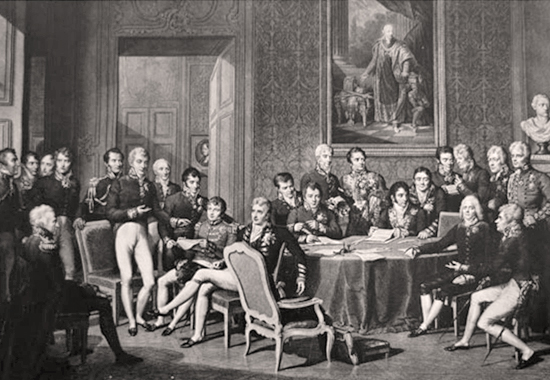Congress of Vienna

As Europe was torn apart over 25 years of war with Napoleon’s campaigns, the year 1815 marks the beginning of a long and strenuous road towards re-establishing the boundaries and affirming the sovereignty of European states. The body of representatives today is constituted of various French and Prussian Counts, the Russian Tsar, and members of Europe’s finest royalty, among others.
So far, the main concerns of the delegation have revolved around the creation of a German confederation for its 39 independent states, in which the representative of Bavaria has expressed her support for the creation of the confederation in the light of the economic benefits the unification could bring, as long as it can preserve its independent kingdom.
Russia has been extremely determined to maintain its power over Poland. Charles Maurice de Talleyrand re-iterated that the purpose of this Congress is for the states involved to come to a consensus together, expressing concerns that other European states were overly emphasizing the rhetoric of national sovereignty and less willing to negotiate for self-interested reasons.
The French delegates expressed their fervent hope of keeping the territories of Alsace-Lorraine, which have been part of the country’s national territory since 1776. The French representative Charles Maurice de Talleyrand stressed the significance of the deep ties his government shares with this region which has been under French tutelage for the last 50 years. The important economic resources the region holds, thanks to its rich supply in coal, is also a point of concern as interests diverge on whether to let France keep ahold of the region. Other European countries appeared hesitant to leave the possibility for the country to rise up again as it had under Napoleon. The main consensus so far has been to let France maintain its control over the region while turning it into a demilitarized buffer zone.
A student from Laval University, representing Russia at the Congress, spoke of how motivating the dynamics of this committee was, and noted that he was really enjoyed the possibility of re-writing history. In comparison to a MUN committee he had participated in last year in Pennsylvania, the smaller number of delegates constituting the body of the committee made it a more pleasant experience as each individual has a greater chance of impacting the outcome of the committee sessions.
While the issues stated above are still being discussed, the future of the committee is aiming at a possible shift towards the creation of a League of Nations, as well as greater regional organizations, which would deal with issues such as slavery, and a stronger European interconnectedness.
